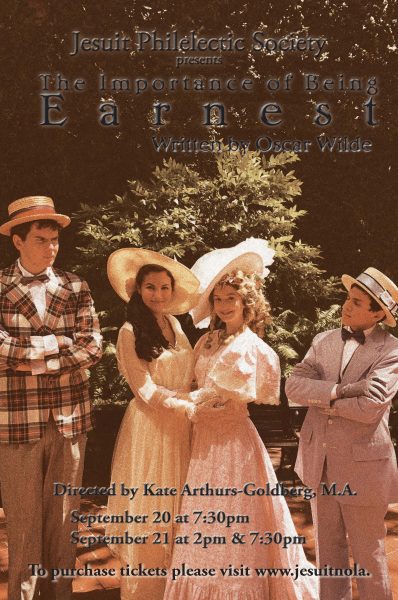Philelectic Society Serves Up a Wilde Spot of Tea in The Importance of Being Earnest

By Theodore P. Mahne
As the lights come up on the stage in the Jesuit Auditorium, a liveried butler appears onstage, nonchalantly clearing the table from a party the night before. The fun, however, is just beginning as the Philelectic Society presents an early-season special production of The Importance of Being Earnest.
In the rarefied world of Victorian drawing rooms and garden parties, things may never go wild – though it’s all quite Wilde. Oscar Wilde, that is.
The troupe, Jesuit’s oldest co-curricular institution, opens its year with Wilde’s 1895 comedy with a bright production and a twinkling cast. Slotted as a “pre-professional production,” the comedy shows the Phils at the top of their game.
It’s usually a good bet that an oft-quoted line (especially a comic one), if not from the Bible or Shakespeare, came from the pen of Wilde. The playwright’s biting humor and exquisite playfulness of the language reaches its pinnacle in “Earnest.” The art of virtually all of Wilde’s comedies is within that use of the language and in the very artifice of the worlds he creates.
Even during the Victorian Age, the carefully cultivated world of Algernon Moncrieff can exist only within the ritualized confines of afternoon tea or in the places to which he escapes to go “Bunburying” (the name of an imaginary invalid he claims to visit in order to avoid other obligations). It is where Wilde’s clever bons mots can become a philosophy of life.
Junior Max Gibson is a sheer delight as Algernon, embodying the play’s subtitle as “a trivial comedy for serious people.” Tall and slim, he creates the sharply angular look of a figure stepping out from an illustration in Punch. Gibson effectively captures Algernon’s devil-may-care ennui, the wealthy lay-about bored by his own pointless entertainments. With a smart blending of a sigh and the character’s own clever self-awareness, Gibson delivers those now-classic witticisms with the same crisp bite that he attacks the tray of cucumber sandwiches.
As the exasperated Jack Worthing, senior Carlo Barrera is a fine comic foil to Gibson’s Algernon, drawing out the more serious qualities of his character, proving that he is truly earnest long before he takes on his secret identity, ensuring his marriage to Algernon’s cousin, Gwendolyn.
Audrey Owen gives Gwendolyn hints of a hot-blooded passion hidden well beneath the coolly prim attitudes demanded by her day and class, especially as she maneuvers Jack to her own will. Sarah Rogers gives Cecily her wide-eyed innocence and sweet simplicity, with a bubbly attitude of romance primarily informed from the “three-volume novels” of the day.
Algernon’s Aunt Augusta, Lady Bracknell, is to “The Importance of Being Earnest” what Dame Maggie Smith’s Dowager Countess of Grantham is to “Downton Abbey” – the tart-tongued maker of manners and vanguard of the established order. Leah Velasquez revels in the role, tossing off Wilde’s most memorable lines with aplomb. Although aloof and steely as Britannia herself, she reveals just enough of the hints of compassion for her extended relations to find a warm spot in the heart of the audience.
In supporting roles, senior Ronnie Bergeron gives a charmingly cartoonish take to the fastidious Rev. Canon Chasuble. Claire Myers is the sweetly befuddled Miss Prism, whose repressed nature hides prim secrets that turn the plot to its cheerful resolution. Senior Ryan Castellon also offers satisfying comic turns as the dry butler Lane and the more animated servant Merriman.
Throughout the show, director Kate Arthurs-Goldberg finds a delicate but precise touch with her exuberant cast that expresses the timing and language of Wilde with snap. She allows the laughs to flow from the play’s smart humor, without a vaudevillian need to puncture the biosphere created by Algernon or Lady Bracknell.
The resulting tone of the overall show is one of wildly infectious and gleeful fun.
The show looks wonderful with richly detailed period costumes assembled by the director and Shannon Bradford. Wig designs by sophomore Jack Garrity, assisted by senior Ben Schabhut, cap off the characters well.
Technical director Ron Goldberg supervised the set designs and the bright projected backdrops which enable the production to be staged so quickly early in the semester. Senior Joseph Ditta heads the efficient backstage crew, which includes senior Mac McCabe, sophomore Jake Nelson, freshmen Andrew Gillen, Chris Geiseler and Joshua Walker, and pre-freshman Charlie Garrity.
Fr. David Paternostro, S.J., served as script supervisor; he and assistant Adam Naquin worked with the cast to capture the language of the piece.
The show runs both Friday and Saturday night at 7:30, with an additional matinee performance at 2 on Saturday. As Lady Bracknell herself might note, “to miss one production by the Philelectic Society may be regarded as a misfortune; to miss this one would just look like carelessness.”
****
Theodore P. Mahne serves on the faculty of the Theology Department. In addition, he is a theater critic for The Times-Picayune/The New Orleans Advocate and NOLA.com.
Tickets are available now, online.
Remaining show dates and times:
Friday, Sept. 20 at 7:30 p.m.
Saturday, Sept. 21 at 2:00 p.m. & 7:30 p.m.